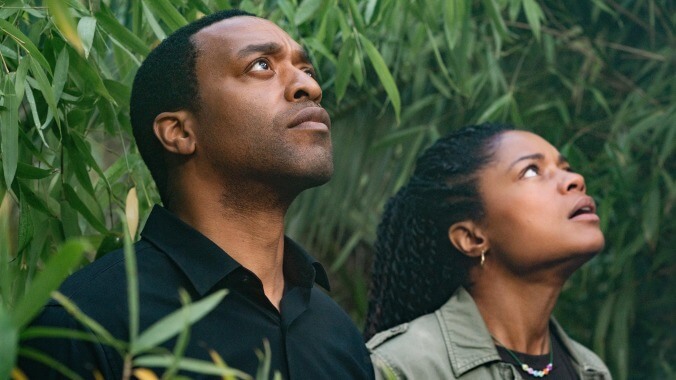Chiwetel Ejiofor talks The Man Who Fell To Earth and these stranger-than-science-fiction times
The star of the new Showtime series also chats about playing your own alien, who can fill David Bowie’s shoes, and whether there are “too many sorcerers”

Who doesn’t love a space alien living next door? Mork & Mindy, ALF, 3rd Rock From The Sun: They’re classics—some, admittedly, better than others—with long cultural shadows. Now, Chiwetel Ejiofor (Doctor Strange, 12 Years A Slave) visits our little blue ball in The Man Who Fell To Earth, a fast-paced sequel to the 1976 sci-fi classic starring David Bowie as spaceman Thomas Newton. (The Showtime series premiered last night, April 24.) This time, though, it’s not a sitcom like those aforementioned shows. It’s serious—like, save-the-planet serious.
In the show, co-created by Jenny Lumet and Alex Kurtzman, Ejiofor’s character literally craters in the oil fields of New Mexico from a distant, dying planet. An extreme fish out of water, he adopts the name of Martha Plimpton’s police officer (Faraday) and sets out on a mission to find the brilliant scientist Justin Falls (Naomie Harris) and a revolutionary patent created by Newton (an older, seedier ET played by Bill Nighy).
The A.V. Club spoke to Ejiofor about finding your inner Martian, his first foray into filmmaking, and how science fiction isn’t so fictional in the age of climate change.
The A.V. Club: Your projects tend to raise large philosophical questions: Who are we? Where do we come from? How do we survive? Is it the work you seek out or just luck?
Chiwetel Ejiofor: There are definitely projects that make me lean in—how to tell the stories of our complicated times, through science fiction or other narratives. With The Man Who Fell To Earth, Alex Kurtzman and Jenny Lumet are asking really big questions from the viewpoint of somebody who’s experiencing the planet in a completely novel way.
AVC: How does one play an extraterrestrial?
CE: You can only play your own alien. You can only ever find those parts of yourself that remind you of when you’ve been on the outside, isolated. We all have them. Most people lock them away and they only pop out, if you’re lucky, in a therapy session. I don’t exactly try to re-experience the first day of school, or moments when I felt outside of things or locked out emotionally. Yet in order to play an alien, you have to go to those places and sit in those feelings.
AVC: But childhood memories play a part?
CE: Certainly: childhood feelings of isolation. Or creative isolation. When you’re not on the same page as anybody. With Faraday, I was intrigued by the idea that if everything is a new experience, how do you then judge where you are? That’s such an interesting space to begin a character’s journey, learning how to physically assimilate, then how to assimilate language. Then you’re trying to understand how to psychologically assimilate. And that’s obviously where it starts to become a metaphor for human migration. My family migrated from Nigeria to the U.K., so I grew up understanding how isolating that can be, how complicated assimilation is.
 Keep scrolling for more great stories.
Keep scrolling for more great stories.
